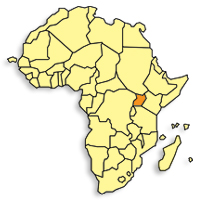From reading “An Ordinary Man” – I learned that traditionally in Rwanda, disputes that arose in villages would be settled in what they called “Gacaca Trials”. “Gacaca” means “justice on the grass,” and would consist of a mini trial whereby people would explain their side of the story. A lot of value is placed on honesty (to oneself and to the community). The community would listen, and would collectively come up with a way to reconcile the dispute – and come up with appropriate punishments.
I was fascinated to learn (at the genocide memorials) that Gacaca trials are currently being used to try some of the perpetrators of the genocide. Because of the sheer number of “genocidaries” – the government has utilized this traditional route. While we were driving up to Pilagie’s village we drove through several trials that were taking place literally, on the grass. The representative from Compassion told us that every two weeks they have trials, and people gather outside under trees and listen to prisoners explain who they killed, how they killed them and where they left the remains in the villages where they performed these acts. He explained that it is therapeutic in a way for many villagers as they can find out where there family members remains are (many of whom are still missing), which may provide some closure. The prisoners’ accounts are recorded and then judges elected within the community, who wear blue, green and yellow (Rwandese colors) sashes, determine a sentence. As we drove through the country, it was weird to see prisoners everywhere, in their light pink garb doing work in the fields, and testifying in the trials.
At the genocide memorial they had a video clip from one of the trials – and it was startling to hear the prisoner explain who he killed and who that person was related to. It seemed bizarre to me, that he knew him – it was people killing their own neighbors.
29.7.07
Subscribe to:
Post Comments (Atom)



No comments:
Post a Comment